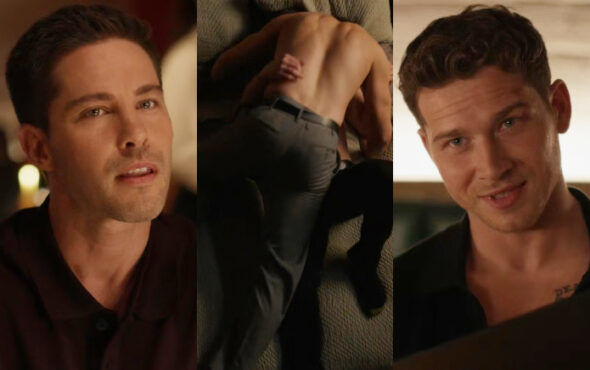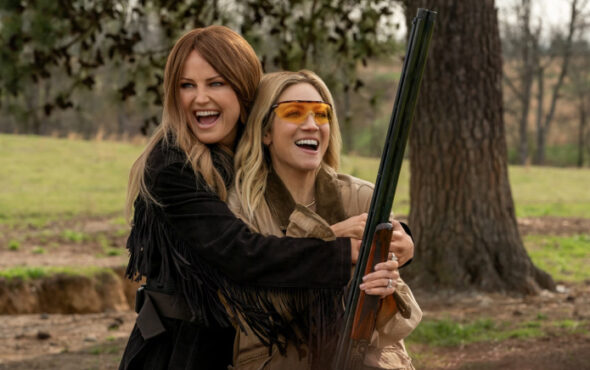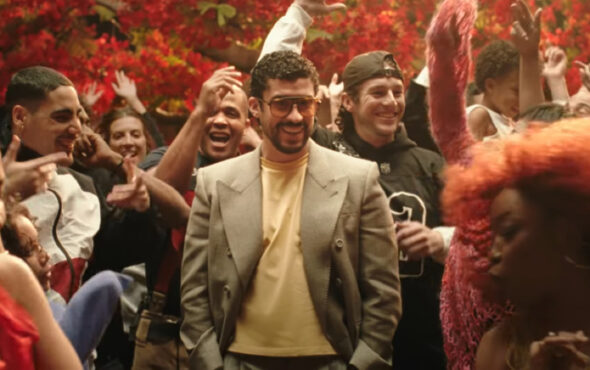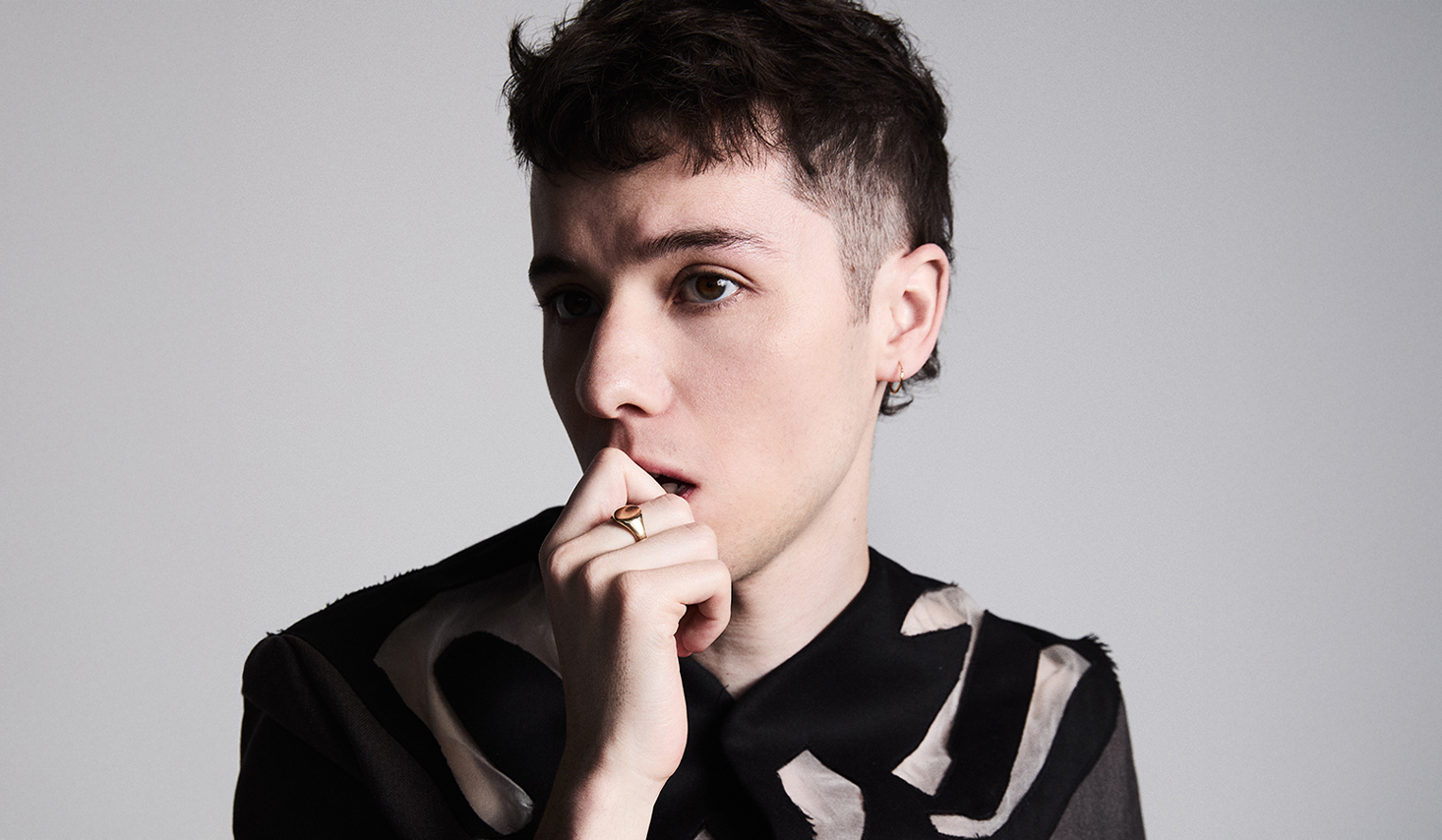
“Powerhouse” doesn’t even begin to capture the full force of Ellis Howard. As Byron in the BBC drama What It Feels Like for a Girl, the Scouser channels raw vulnerability and biting wit to bring Paris Lees’ acclaimed memoir to the screen — offering a fearless and deeply human portrait of a trans, working-class person rarely seen on British television.
Amid the ongoing vilification of trans people in the media and politics, the show couldn’t feel more timely. As Ellis tells Gay Times: “It is a really dark moment politically. I feel proud to be part of a show that humanises a trans experience. There’s so much queer representation on screen right now, and behind the screen too, and I’m proud that we’re contributing to that with something that is uplifting, euphoric and joyful.”
Set at the turn of the millennium, What It Feels Like for a Girl follows Byron, a working-class teen whose flamboyance clashes with their macho father’s expectations and makes them a target of anti-LGBTQIA+ violence at school. Byron escapes to Nottingham’s rainbow underworld, where they discover a world of drink, drugs and a chaotic chosen family in Lady Die (Laquarn Lewis), Sticky Nikki (Alex Thomas-Smith), Dirty Damian (Adam Ali), and Sasha (Hannah Jones).
Also starring Laura Haddock, Hannah Walters, Michael Socha, Calam Lynch and Jake Dunn, What It Feels Like for a Girl carries – Ellis says – “a kind of historic weight, reminding people that trans lives have always existed, and will continue to exist long after this moment.”
As the series lands on BBC Three and BBC iPlayer, Gay Times caught up with Ellis to discuss this trailblazing story of the trans and working-class experience, unpacking Byron’s “mythic queer resilience” in the show’s most emotionally charged moments, and how What It Feels Like for a Girl sparked a personal “queer renaissance” for him. Warning: major spoilers ahead.
Ellis, What It Feels Like for a Girl is absolutely outstanding, so major congratulations. I felt so many emotions, primarily joy, anxiety and dread, a lot of the time within a single scene. How are you feeling about this important and timely series being released into the world?
I’m feeling exactly how you feel watching it: joy, dread, joy again and anxiety. Honestly, the show feels really alive — and a bit dangerous — as a proposition. Even when I first heard it was getting made, I thought, ‘Are they really going to do this? The BBC? We’re actually doing this?’ I go through waves of fear, but I think at the heart of it, it’s that universal actor’s fear: ‘Am I good enough?’ I love Paris [Lees] and the book so much. So I just really hope I’ve done this character justice. That’s where a lot of the anxiety comes from.
But I also feel joy. It’s such an exciting show. To me, it really feels like This is England. It gets under the dirt of the fingernails of a queer, working-class experience. If I’d had a show like this growing up, maybe I would’ve found myself a bit sooner. So yes, I’m excited — but also, who knows what’s going to happen? Who knows how it’ll be received? I’ve done a lot of shows that felt safer, but this one feels like a rallying cry from a council estate. I’m curious to see how people respond, and whatever that response is, it’ll spark conversation. And I think that’s what art is meant to do.
You’re so wonderful in this, by the way. Byron is such a layered, complicated and beautiful character. What was it like securing this role? It’s based on Paris Lees’ memoir, and she played a key role in casting the actors who would bring her story to life, right?
Yes! I had read the book a while ago and absolutely loved it. When I heard they were adapting it, I was like, ‘Oh my god, I want to be in that writers’ room.’ I act, but I write as well, and reading the book felt like reliving so many moments from my own life. I just thought, ‘I have to be involved somehow.’ I wanted to hear the conversations, offer thoughts. But I couldn’t do it at the time because I was doing a play and it clashed. Then they started casting — and I think it went on for about nine months, if I’m not mistaken. At some point, they reached out to me, not even to audition initially. They just said, ‘Would you be interested in a conversation about the role?’ I was already a huge fan, so I wanted to know more.
After that chat, they really put me through my paces! I ended up doing four or five auditions. When I finally got the part, I felt this wave of deep, deep euphoria. I remember saying to my boyfriend, ‘I’m going to become friends with Paris Lees. Do you think she’ll come to my birthday party?’ I was just obsessed with the project. Of course, about an hour later, the dread set in, ‘How the fuck am I going to do this?’ Because you’re right, Byron’s journey is a real odyssey. They go from precocious brat to deeply wounded child to femme fatale, sometimes all within a single scene. It’s this relentless, volatile ride into the underworld.
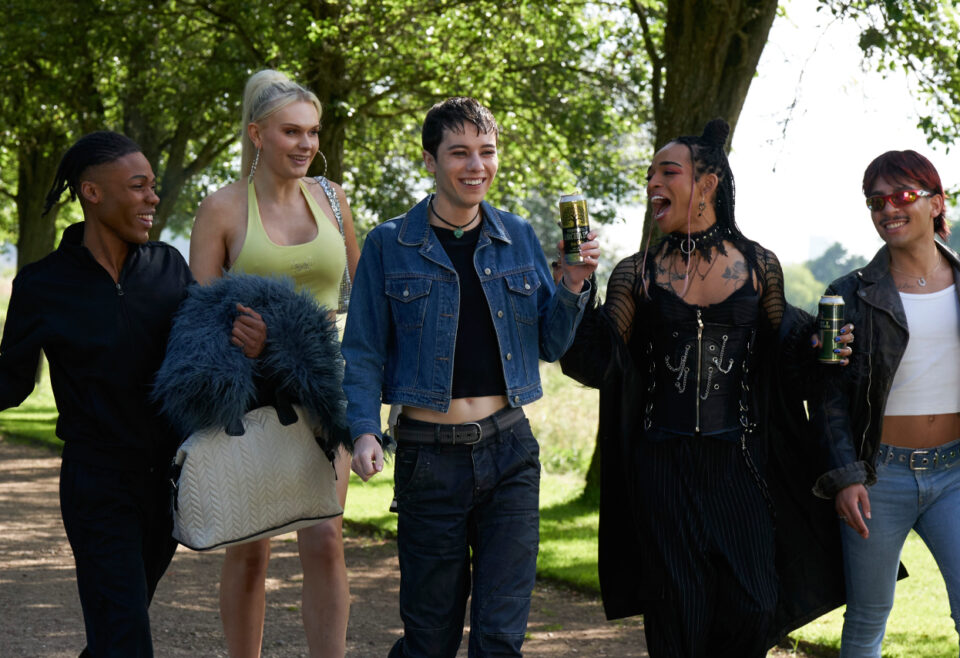
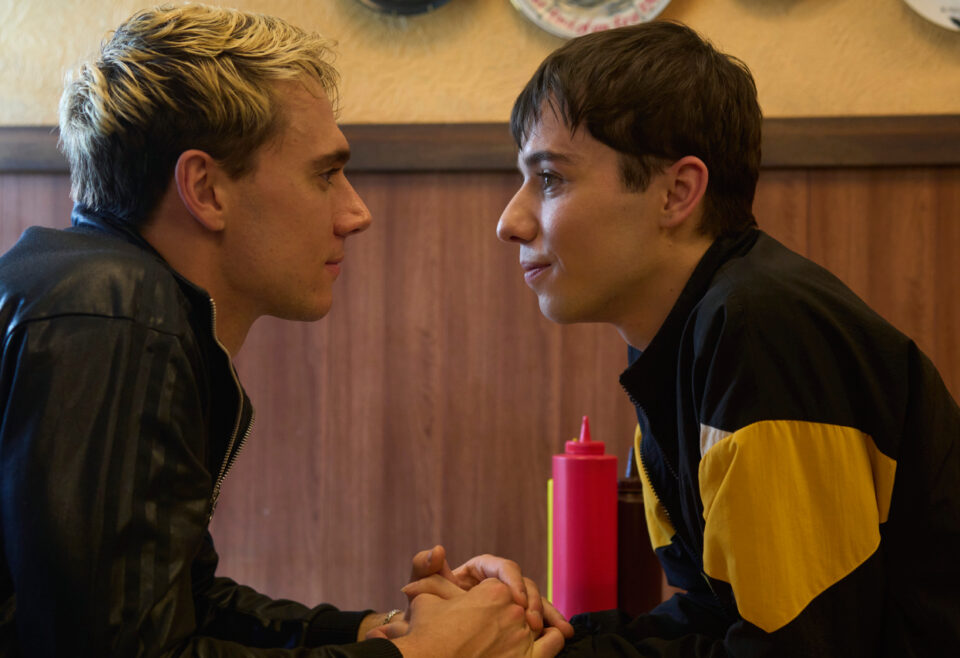
You mentioned that aspects of the novel resonated with you. So what was it about Byron, were there parts of their journey that felt personal or familiar to you?
What I think the book does so brilliantly is show that, obviously, no queer or trans experience is a monolith. Every story is singular, complex and nuanced in its own way. But for me, the book really touched on something about the working-class queer experience that I don’t think we’ve ever truly seen on television before. It didn’t feel sanitised. Paris talks about this so powerfully. She’s said that the show takes place in the aftermath of Thatcher’s Britain: the mines are shut, the industry’s gone and this is about a community that doesn’t even have a seat at the table. When you’re queer too, it’s like you’re not even allowed to sit with the people who already don’t have a seat. You’re even further ostracised.
There’s a great moment in episode five, where Byron is on that talk-show and they say, ‘If you force people into the shadows, don’t be surprised when they go fucking dark.’ That really hit me. Growing up, I was grateful for any kind of queer representation on screen, but what the book does — and what the show continues — is talk about the things we often don’t want to say: that sometimes queer lives touch moments of real danger, of real transgression. They exist in liminal spaces. For me, I had no structure. No one taught me how to be queer. I didn’t have role models. It was a real trial-and-error process.
One of the things I’m most proud of, and most grateful for, is that at my big old age, I feel like I’ve had a queer renaissance. It was the first time in my life I was surrounded by queer people, and I felt like, ‘Oh my god, this is who I am.’ It was like I’d been handed a passport to myself, to authenticity. Now, Byron’s story has a very clear journey, from A to B. The destination is sharp and definite. Mine hasn’t been that. Mine’s messier. But I’m so grateful that this book gave me the chance to meet these people, and in doing so, I felt like, ‘I’m finally starting to feel like myself for the first time.’
So your journey mirrors Byron’s, especially in terms of finding queer chosen family and how important that is.
Sam, during the chemistry read… I’d actually known Hannah [Jones], who plays Sasha. We knew each other when she was about 11 and I must’ve been around 13. This was back in Liverpool, at this acting school we both went to for free because we were these wrecked little council kids. Although, to be fair, she’s a bit posher than me! Anyway, I hadn’t seen her in years. She walked into the chemistry read in nine-inch heels, full of energy, and said, ‘I know you! Ellis Howard, I’ve been following you for years on Instagram!’ I was completely stunned by her energy, but I also had this feeling: ‘I’m about to have the summer of my life with these people.’
The same goes for Laquarn. One of the first things we all did together was sit out on Laquarn’s balcony and tell our coming out stories. We just talked, shared and I think it was because we knew we were making something rare. This kind of story doesn’t get told very often. Because we understood the weight of that, we all just dropped our guards immediately. We were so vulnerable with each other, right from the start. We wanted to push each other, to go there emotionally, to show our most triumphant and traumatised and messy selves every single day. We became thick as thieves almost instantly. Honestly, the cast became my chosen family.
What It Feels Like for a Girl feels incredibly timely. It couldn’t be arriving at a more critical moment, especially given the ongoing attacks and vilification of trans people in both the media and politics. What does it mean to you to be offering this kind of visibility right now?
I guess a better time would be one where trans people aren’t having their rights stripped away by our Supreme Court. That’s the truth. I feel a lot of things — and honestly, Hannah and Paris speak about this far more articulately than I do — but I do feel deeply proud on several fronts. I feel proud to be part of a show that humanises a trans experience. There’s so much queer representation on screen right now, and behind the screen too, and I’m proud that we’re contributing to that with something that is uplifting, euphoric, and joyful.
To be putting something like that out into the world right now feels important. But at the same time, it is a really dark moment politically. I feel incredibly grateful to be immortalised standing alongside my trans brothers and sisters. If we can do anything, even if it’s just through people reaching out to us on Instagram, I hope we can direct them to communities, to resources, to organisations like Not a Phase, which we’re raising money for. I really hope the show gives people joy, laughter, some kind of light in an otherwise very heavy time.
And it might sound strange, but I do think this show has a kind of historic weight. It reminds people that trans lives have always existed, and will continue to exist long after this moment. That’s powerful. For me, someone who doesn’t have trans experience, I feel it’s so important to be as vocal, as active and as feverish in my support, in protest, in donations, in allyship, as I possibly can be. So yes, while it’s devastating that this is the political climate we’re in, I feel proud to be part of something led by Paris that pushes back against it with beauty, humanity and joy.
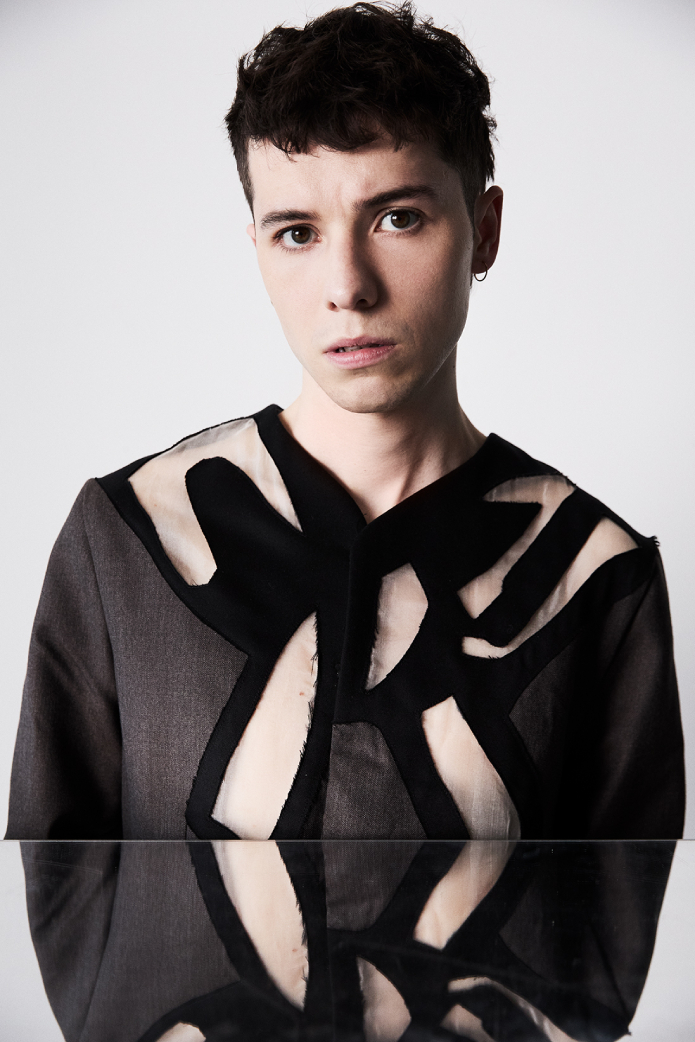
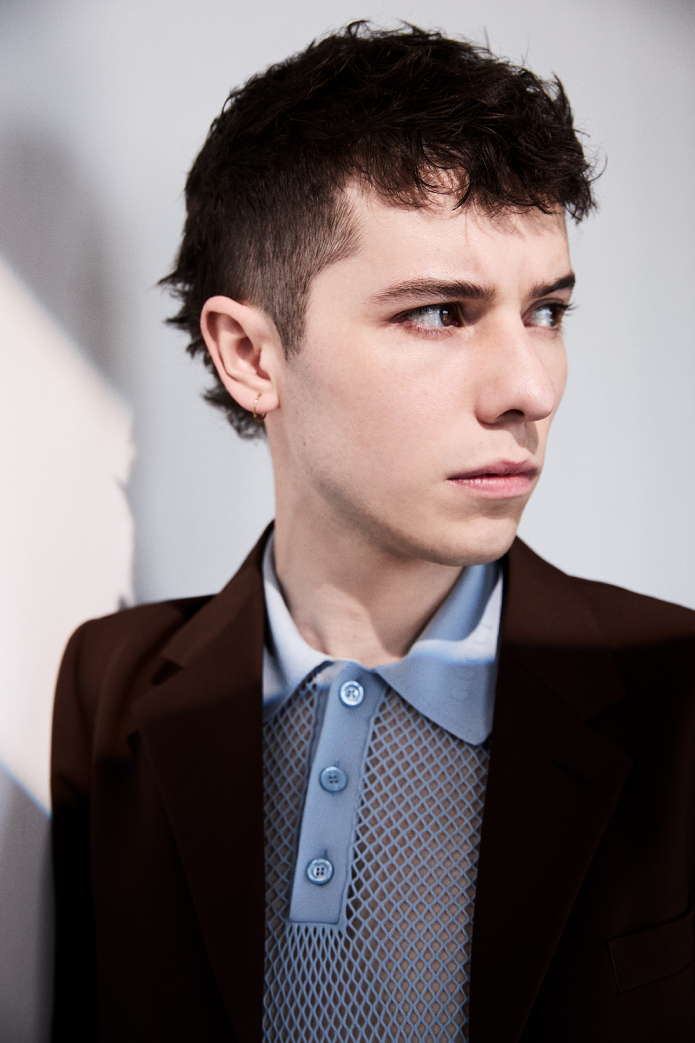
As well as queer joy, the series doesn’t shy away from queer trauma. What was it like for you as an actor to take on the more intense scenes, particularly those dealing with anti-LGBTQIA+ violence and gender dysphoria?
I read the book so many times I felt nauseous. It’s that raw. I had loads of conversations with Paris, and one of the things I think the script does brilliantly is capture the spirit of the book without watering anything down. So much of the work came through conversations — with Paris, with our lead director Brian, just figuring out how to meet those tougher moments honestly. There’s this scene in episode three — spoiler alert! — where Jake Dunn’s character, Liam, puts Byron on the phone with a man in a toilet. Afterward, Paris came up to me in tears and said, ‘El, this is exactly Byron. This is exactly what I wanted.’ That moment meant everything.
While Byron’s story includes real trauma, there’s also this almost mythic queer resilience in them. They are subversive and outrageous. That’s empowered me, in my own life. A lot of the process was asking myself, ‘How would I deal with this?’ and then realising, ‘Right, we probably need to do the opposite.’ Byron’s survival strategy is often the cheekiest, naughtiest route through pain. That’s where their spirit lives. It all came down to embracing fear, being willing to go there emotionally. We all know what it is to want to escape, whether through partying, fighting, disappearing. And Paris is so brutally honest on the page that you feel a responsibility to meet that energy head-on.
Sometimes that just means taking out your earrings, putting your hair in a bun, and going for it. No overthinking, just raw instinct. And honestly, having such an incredible cast made everything easier. Sparring with actors like Michael Socha and Laura Haddock, who are so good, makes you better. When it came to the more intimate or triggering scenes, we always felt safe. Of course, we were exploring unsafe territory, but we had the most amazing crew and an incredible intimacy coordinator. It all felt very collaborative and respectful.
While a major spoiler, it feels important to talk about the depiction of underage sex work in the series. What It Feels Like for a Girl doesn’t shy away from showing how, for some queer people, sex work can be part of their reality. As you said earlier, though, it’s not a monolithic experience. In Byron’s case, it feels like there’s an element of choice or agency involved. What was important to you in portraying this part of her story with care and authenticity?
What’s important, and Paris speaks about this so brilliantly because a version of it is her own history, is that this is ultimately about class. It ties back to what we talked about earlier: when you force people into the shadows, what happens then? That’s a crucial part of this story. I think what’s really brave is the question of agency. You mentioned earlier that it seems like Byron chooses this. But I think an equally important question is: why do these men do this?
Paris has said that, at the time, she didn’t even realise it was abuse. And that’s key: we’re looking at all of this through a 2025 lens. But at the start of the series, Byron is 15. So when you’re that young, with no money, no structure, no support from family or community, and suddenly someone gives you attention or makes you feel seen, it can feel like validation, like love. And then, much later you realise, ‘Wait, that was abuse.’
Paris articulates that experience beautifully, how she didn’t know it was wrong at the time, but she does now. The show absolutely doesn’t glamorise sex work, especially not underage sex work. Hopefully, what it does instead is make people go, ‘Hang on, what are these men doing? This is a child who needs protection, love, support.’ Yes, Byron finds that through the fallen divas. But the bigger question remains: ‘Who are those men? The ones in the toilets? That police officer?’
That’s where the show begins to ask really complicated questions. Not just about what queer people are forced to do in the shadows, but also: what are other people doing in the shadows? It opens up a very important conversation about masculinity, power and how men show up in our society — especially when they think no one is watching.
Ellis, thank you for taking the time to discuss this incredible, groundbreaking series with me. On a final note, you’re also a writer and the founder of Step Up For Scousers. Can you talk to me a little bit about those ventures and what we can expect next from you?
I am writing. I am a writer! I’m currently developing a semi-biographical show for Netflix, and I’m also working on a series with my best mate, Toheeb Jimoh, about our experiences in drama school. There’s another exciting project I can’t quite talk about yet. I almost just blurted it out! For now, I’ll just say I’m attached as a writer and performer on a few things, which I’m incredibly grateful for. That said, who knows? I might be acting next. Hopefully people watch the show and think, ‘Let’s get Ellis in the room.’ So fingers crossed for that.
Step Up For Scousers is a nonprofit I run with my mum, my nana, and my auntie. We operate it out of my house in Liverpool, and mainly around Christmas, Easter, and other school holidays, times when young people might not have access to free school meals. We head out into the community with essentials: milk, tampons, baby formula, shampoo. If we have the budget, we buy Christmas presents too.
I grew up poor, and the only reason I’m an actor today is because I had access to free arts training. That made me feel seen, and I think that’s what Byron’s craving through so much of their journey: to be truly loved and supported. So we go out to families in our area, ones we’ve been supporting for years, and we just give them what they need. Every penny goes to them. It’s like a little food bank on wheels, though we don’t operate at the same scale as the big ones. It’s just a little family-run gang doing what we can!
What It Feels Like for a Girl is now streaming in full on BBC iPlayer.
